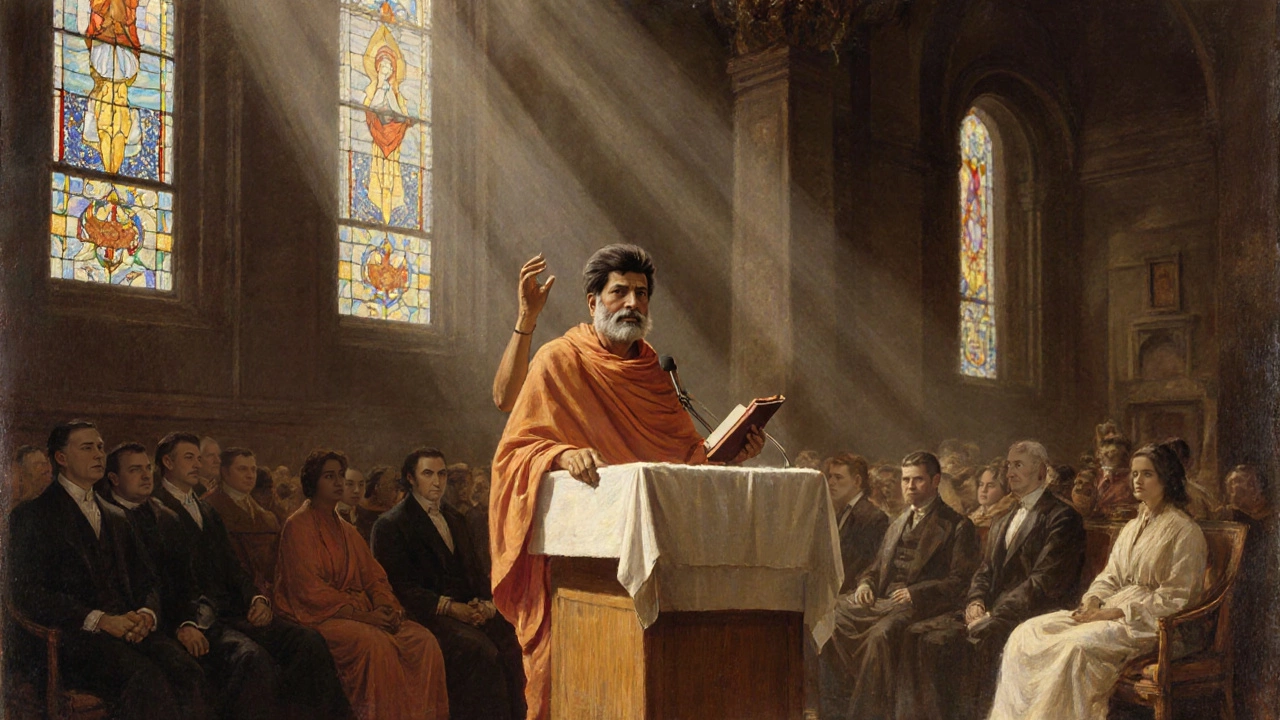Indian Motivational Quote Explorer
"Arise, awake, and stop not till the goal is reached."
— Swami Vivekananda, 1893
- Arise: Get up, take action, don't remain passive
- Awake: Become conscious of your abilities and potential
- Stop not till the goal is reached: Persist relentlessly until your objective is achieved
Swami Vivekananda was a Hindu monk and philosopher who brought Indian spiritual ideas to the Western world. Born in 1863 in Kolkata, he delivered a historic speech at the Parliament of Religions in Chicago in 1893.
His teachings emphasized self-discipline, service, and the awakening of one's inner potential.
- Historical significance during India's independence movement
- Universal language that transcends regional barriers
- Rhythmical structure makes it memorable and shareable
- Action-oriented phrasing for practical application
| Quote | Author | Core Message |
|---|---|---|
| "Arise, awake, and stop not till the goal is reached." | Swami Vivekananda | Relentless pursuit of purpose |
| "Be the change that you wish to see in the world." | Mahatma Gandhi | Personal responsibility for social change |
| "Dream, dream, dream. Dreams transform into thoughts and thoughts into action." | Dr. A.P.J. Abdul Kalam | Power of dreaming and acting |
- Morning mantra: Place the quote somewhere visible and read it aloud each morning
- Micro-goals: Break large ambitions into small daily actions
- Weekly check-in: Reflect on whether you "arose" and "awoke" to your potential
- Share the fire: Discuss your progress with others to reinforce commitment
- Over-idealizing: Don't expect instant results; pair with realistic planning
- Ignoring rest: Balance persistence with necessary breaks
- One-size-fits-all: Adapt the message to your specific context and goals
- Karmanye vadhikaraste – From the Bhagavad Gita, meaning "You have a right to perform your duties, but not to the fruits."
- Lakshya ki baat karo, bhay ki nahi – Roughly "Talk about goals, not fears."
- Mehnat se hi safalta milti hai – "Only hard work brings success."
These proverbs reinforce the central message: action beats anxiety.
When you think of a famous Indian motivational quote, one line instantly pops up for many: “Arise, awake, and stop not till the goal is reached.” This powerful sentence has been shouted in classrooms, office meetings, and social media feeds across the sub‑continent for over a century. In this article we’ll unpack where the quote comes from, what it really means, and how you can turn its spirit into real‑world results.
What the Quote Says - Plain English Translation
The original words were spoken in English by Swami Vivekananda during his famous address to the Parliament of Religions in Chicago, 1893. Here’s the line in simple terms:
- Arise - Get up, stop being a spectator.
- Awake - Become aware of your strengths and possibilities.
- Stop not till the goal is reached - Keep pushing until you achieve what you set out to do.
Put together, it’s a call to action that refuses complacency.
Who Said It? Meet Swami Vivekananda
Swami Vivekananda was a Hindu monk, philosopher, and one of the first Indian leaders to bring the country’s spiritual ideas to the West. Born in 1863 in Kolkata, he traveled across India studying different traditions, then set out for the United States in the 1890s. His speech in Chicago sparked worldwide interest in yoga and Indian philosophy, and the "arise, awake" line became his signature motto.
Vivekananda believed that every human being has an inner fire - a divine potential that can be awakened through self‑discipline and service. The quote captures his belief that we must actively nurture that fire, not sit on the sidelines.

Why This Quote Became a Staple in Indian Motivation
Three main reasons turned this sentence into a cultural touchstone:
- Historical timing - The late 19th century was a period of Indian awakening against colonial rule. The call to rise resonated with freedom fighters and youngsters alike.
- Universal language - Unlike many regional sayings, Vivekananda used clear English that could be read by college students, army officers, and merchants across the country.
- Action‑oriented phrasing - The three‑word rhythm is easy to remember and repeat, making it ideal for posters, speeches, and today’s social‑media memes.
Three Iconic Indian Motivational Quotes - Side‑by‑Side
While Vivekananda’s line tops the list, India has produced several other sayings that motivate millions. The table below compares them on author, original language, core message, and typical use.
| Quote | Author | Original Language | Core Message | Common Context |
|---|---|---|---|---|
| “Arise, awake, and stop not till the goal is reached.” | Swami Vivekananda | English | Relentless pursuit of purpose | Education, leadership talks |
| “Be the change that you wish to see in the world.” | Mahatma Gandhi | English (paraphrased) | Personal responsibility for social change | Social activism, community projects |
| “Dream, dream, dream. Dreams transform into thoughts and thoughts into action.” | Dr. A.P.J. Abdul Kalam | English | Power of dreaming and acting | Student workshops, innovation programs |
How to Turn the Quote into Daily Habit
Reading a line once won’t change your life. Here’s a straightforward routine to make the spirit of Vivekananda’s words work for you:
- Morning mantra: Write the quote on a sticky note, place it on your bathroom mirror, and read it aloud each morning.
- Set a micro‑goal: Break a big ambition (e.g., learning a new skill) into a 30‑minute daily chunk. The "stop not till the goal" part becomes literal - you keep moving forward.
- Weekly check‑in: Every Sunday, ask yourself - Did I "arise" today? Did I feel "awake" to my strengths? Note progress in a journal.
- Share the fire: Tell a friend or post on social media about a small win. The act of speaking the quote out loud reinforces commitment.
Within a month, you’ll notice a shift from vague inspiration to concrete forward motion.

Common Mistakes and How to Avoid Them
Even the most powerful quote can be misused. Here are three pitfalls and quick fixes:
- Over‑idealizing - Treating the line as a magic spell leads to disappointment. Remember, the quote is a catalyst, not a guarantee. Pair it with realistic planning.
- Ignoring rest - "Stop not till the goal" can be taken as “never pause.” Your body needs breaks. Schedule short rests to keep energy high.
- One‑size‑fits‑all thinking - What works for a student may not suit a senior executive. Adapt the phrasing to your context: “Arise in my role, stay awake to opportunities, and keep moving toward my next promotion.”
Beyond the Quote - Related Indian Wisdom
If you love the vibe of Vivekananda’s words, you might also enjoy these short Indian proverbs that echo similar ideas:
- “Karmanye vadhikaraste” - From the BhagavadGītā, meaning “You have a right to perform your duties, but not to the fruits.”
- “Lakshya ki baat karo, bhay ki nahi” - Roughly “Talk about goals, not fears.”
- “Mehnat se hi safalta milti hai” - “Only hard work brings success.”
Each one reinforces the message: action beats anxiety.
Frequently Asked Questions
Who originally said “Arise, awake, and stop not till the goal is reached”?
The line was spoken by Swami Vivekananda at the Parliament of Religions in Chicago in 1893.
What does the quote actually mean?
It encourages you to get up, become aware of your potential, and keep working toward your objective without giving up.
Can I use this quote for business motivation?
Absolutely. Leaders often cite it in team meetings to stress persistence and focus on results.
Is there a Hindi version of the quote?
A common Hindi rendering is: “उठो, जागो और लक्ष्य हासिल होने तक रुकना नहीं।” It carries the same spirit.
How can I remember the quote throughout the day?
Write it on a phone wallpaper, a daily planner, or set a recurring reminder with the line. Visual cues keep the message alive.
